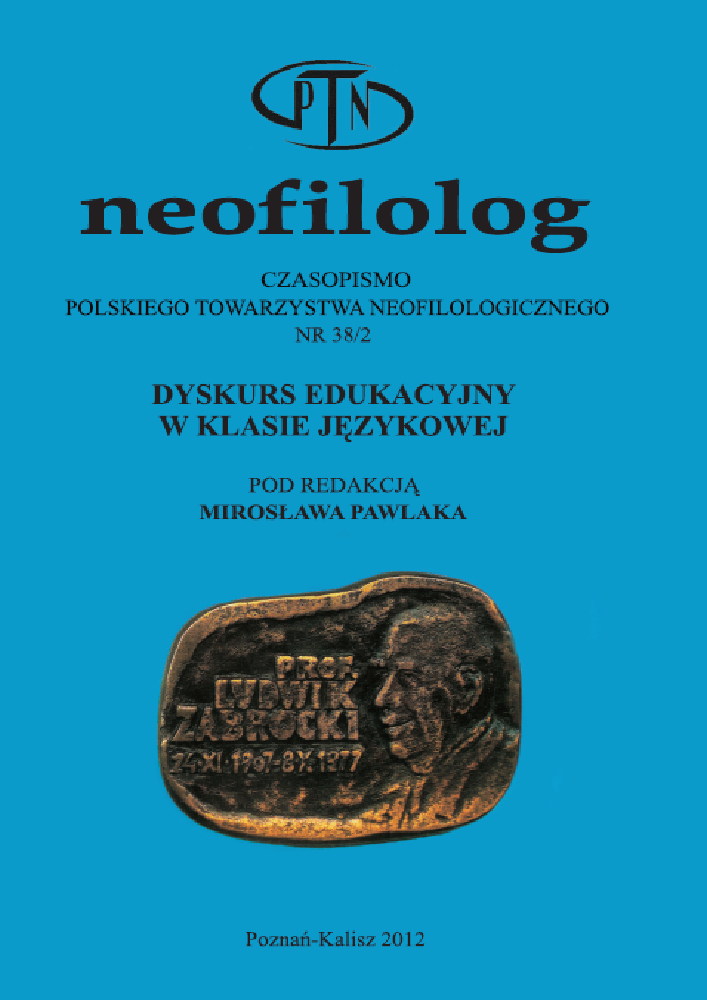Abstract
The present paper is a report on the author’s own teaching experiences and focuses on the creation of learning situations in a virtual environment. The main aim is to define the characteristics of a learning situation in such an environment. More precisely, the paper focuses on: (1) answering the ques-tion whether – and to what extent – current studies on the model of hybrid education provide the necessary information useful in developing the pro-fessional competence of teachers willing to use ICT tools in their work, and, (2) drawing conclusions about the author’s own teaching experiences, whose aim is to determine what types of actions on the part of the teacher, concerning on the one hand, the task’s scenario and, on the other hand, his or her intervention in a virtual environment, can contribute to learning. The article emphasizes the necessity of perceiving interaction in a virtual envi-ronment as a separate communicative situation which requires specific skills both on the part of the teacher and the learner.
References
Bélisle, C. 2010. „Les technologies: quels usages, pour quels effets?” [w:] Charlier, B. i Henri, F. (red.). Apprendre avec les technologies. Paris: PUF. 35-45.
Burton, R. i in. 2011. „Vers une typologie des dispositifs hybrides de formation en enseignement supérieur”. [w:] Distances et savoirs 9: 69-96.
Celik, C. 2008. „Analyse de pratiques de tutorat dans un campus numérique de maîtrise de français langue étrangère à distance”. [w:] Apprentissage des Langues et Systèmes d’Information et de Communication (Alsic) 11: 93-119. (http://alsic.revues.org/index833.html) [DW: 27.11.2011].
Charlier, B., Deschryver, N. i Peraya, D. 2006. „Apprendre en présence et à distance. Une définition des dispositifs hybrides”. [w:] Distances et savoirs 4: 469-496.
Chen, D.-T., i Hung, D. 2002. „Personalised knowledge representations: the missing half of online discussions”. [w:] British Journal of Educational Tech-nology 33: 279-290.
Daele, A. i. Docq, F. 2002. „Le tuteur en ligne, quelles conditions d’efficacité dans un dispositif d’apprentissage collaboratif à distance?” [w:] Actes du 19e Colloque de l’AIPU, Louvain-la-Neuve, mai 2002. (9 stron). http://www.ipm.ucl.ac.be/articlesetsupportsIPM/DocqDaeleAIPU2002.pdf [DW: 30.11.2011]
Degache, Ch. i Nissen, E. 2008. „Formations hybrides et interactions en ligne du point de vue de l’enseignant: pratiques, représentations, évolutions”. [w:] Apprentissage des Langues et Systèmes d’Information et de Communication (Alsic) 11: 61-92. (http://alsic.revues.org/index797.html) [DW: 30.11.2011].
Ellis, R. A., Goodyear, P., Prosser, M. i O’Hara, A. 2006. „How and what university students learn through online and face-to-face discussion: conceptions, inten-tions and approaches”. [w:] Journal of Computer Assisted Learning 22: 244-256.
Gajek, E. 2008. Edukacja językowa w społeczeństwie informacyjnym. Warszawa: Insty-tut Lingwistyki Stosowanej UW.
Górecka, J. 2009. „Wprowadzanie elementów nauczania hybrydowego w kształceniu językowym; uzasadnienie dydaktyczne oraz główne wyzwania dla nauczyciela”. [w:] Neofilolog 33: 41-52.
Groves, M. i O’Donoghue, J. 2009. „Reflections of students in their use of asynchro-nous online seminars”. [w:] Educational Technology & Society 12. 143-149.
Hanna, B. E. i de Nooy, J. 2009. Learning language and culture via public Internet discussion forums. Basingstoke; New York: Palgrave Macmillian.
Karsenti, T. i Fortin, T. 2005. „Collaboration par les TIC. Nouveau défi de la formation pratique?” [w:] Deaudelin, C. i Nault, T. (red.). Collaborer pour apprendre et faire apprendre. La place des outils technologiques. Sainte-Foy, Québec: Presses de l’Université du Québec. 81-101.
Krajka, J. (2012). The language teacher in the digital age – towards a systematic approach to digital teaching development. Lublin: Wydawnictwo UMCS.
Mangenot, F. i Penilla, F. 2009. „Internet, tâches et vie réelle”. [w:] Le Français dans le monde, Recherches et applications 45. Paris: CLE International. 82-90.
Martin, D. 2005. „Forum de discussion en formation des maitres. Apprentissage de la délibération collégiale”. [w:] Deaudelin, C. i Nault, T. (red.). Collaborer pour apprendre et faire apprendre. La place des outils technologiques. Sainte-Foy, Québec: Presses de l’Université du Québec. 103-119.
Meyer, K. A. 2006. „The method (and madness) of evaluating online discussions”. Journal of Asynchronous Learning Networks 10: 83-97. (http://www.aln.org/publications/jaln/v10n4/pdf/v10n4_meyer1.pdf) [DW: 30.11.2011].
Palloff, R. M. i Pratt, K. 2007. Building online learning communities. Effective strategies for the virtual classroom. San Francisco: Wiley.
Soubrié, T. 2008. „La difficile articulation du présentiel et de la distance dans le cadre d’un cours hybride en master”. [w:] Apprentissage des Langues et Systèmes d’Information et de Communication (Alsic) 11: 105-126. (http://alsic. revues.org/index385.html) [DW: 30.11.2011].
Walckiers, M. i de Praetere, T. 2004. „L’apprentissage collaboratif en ligne, huit avantages qui en font un must”. [w:] Distances et savoirs 2. 53-75.
Weasenforth, B., Biesenbach-Lucas, S. i Meloni, Ch. 2002. „Realizing constructivist objectives through collaborative technologies; threaded discussions”. [w:] Language Learning & Technology 6: 58-86. (http://llt.msu.edu/vol6num3/weasenforth/) [DW: 30.11.2011].
License
Copyright (c) 1970 Joanna Górecka

This work is licensed under a Creative Commons Attribution-NoDerivatives 4.0 International License.
Authors
Authors of texts accepted for publication in Neofilolog are required to complete, sign and return to the Editorial team’s office the Agreement for granting a royalty-free license to works with a commitment to grant a CC sub-license.
Under the agreement, the authors of the texts published in Neofilolog grant Adam Mickiewicz University in Poznań a non-exclusive, royalty-free license and authorize the use of Attribution-NoDerivatives 4.0 International (CC BY-ND 4.0) Creative Commons sub-license.
The authors retain the right to the free disposal of the work.
Users
Interested Internet users are entitled to use works that have been published in Neofilolog since 2017, under the following conditions:
▪ attribution – obligation to provide, together with the distributed work, information about the authorship, title, source (link to the original work, DOI) and the license itself.
▪ no derivatives – the work must be preserved in its original form. Without the author's consent, it is not possible to distribute the modified work in the form of translations, publications, etc.
Copyrights are reserved for all texts published since 2017.
Miscellaneous
Adam Mickiewicz University in Poznań retains the property right as a whole (layout, graphic form, title, cover design, logo etc.).
